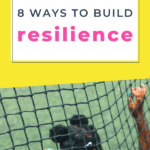From Helpless To Hopeful: How To Raise Resilient Kids
Do your kids give up easily? Here’s what parents can do to raise resilient kids who know how to stay positive and keep going – no matter what!
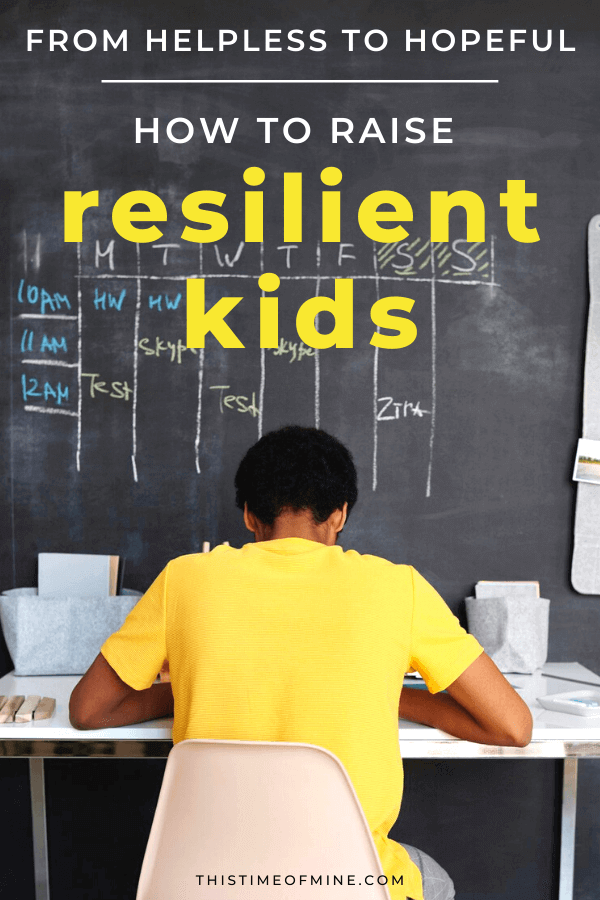
As parents, we want to protect our kids from difficulty, disappointment and stress.
But unfortunately, we can’t do that. Because in reality, we can’t shield our kids from every hard thing. It’s impossible.
Luckily, we can do something better.
We can equip our kids with the tools necessary to deal with life’s challenges, big or small. And in the end, this will prove to be a far greater gift.
If you have a child who gives up easily, is afraid to try hard things, or doesn’t deal with difficulty well, then these tips will help you know how to help your child. They’re proven strategies for building grit that help parents in their efforts to raise resilient kids who are optimistic, strong, and hopeful.
A QUICK NOTE ABOUT FAILURE
Parents are often told that failure and frustration is good for kids and helps them build resilience. But how much is the right amount?
It’s not always an easy decision to make, which is why parents often fall into 2 camps: “Curlers” and “Observers”.

Camp #1: The Curlers
In the Olympic sport of Curling, curlers frantically “sweep” and warm up the ice to reduce as much friction as possible. In other words, they act a lot like many parents.
Too often, parents vigorously put forth every effort to reduce any and all friction in their child’s life. They remove barriers, coddle feelings, and help them avoid failure. Because failure is hard.
Camp #2: The Observers
Some parents, in an effort to avoid being overprotective, assume a more passive stance. They feel that life is full of difficulty, so their kids might as well learn to deal with it now.
They offer little support and assume this is the best way to raise kids who know how to be resilient.
FAILURE IS ONLY PART OF THE PICTURE
Perhaps you have spent time in one of these two camps. Or maybe you find yourself somewhere in the middle, wondering what your parental role should be. You know it’s good for kids to work through their problems, but you’re struggling to find that perfect balance of support.
It’s true that failure helps to build resilience, but it’s only part of the picture. Because true resilience is knowing that despite failure, we can pick ourselves up, keep going, and eventually find success.
Kids who fail again and again without proper support only learn one thing – they are failures.
But you and I both know that our kids aren’t failures. And we certainly don’t want them thinking that they are. So how can we raise our kids to be truly resilient? How can we find that sweet spot between offering support and allowing for independence?
Here are 8 research-based ways.
HOW TO RAISE RESILIENT KIDS WHO DON’T GIVE UP

This post contains affiliate links. For more information, see my disclosures here.
1. BE A STRONG SUPPORT SYSTEM FOR YOUR KIDS
Why are some kids able to be more resilient than others? According to The Center On The Developing Child at Harvard, “The single most common factor for children who develop resilience is at least one stable and committed relationship with a supportive parent, caregiver, or other adult.”
In other words, kids need connection. Our kids need to know that they are safe with us and that our relationship is steady.
It can be hard to find one-on-one time with your child every day, especially if you have multiple kids. But it doesn’t take much to help your child feel loved and validated. The key is to make the interactions you’re already having more meaningful whenever possible.
Quick Tip: Make sure your kids know how YOU feel. For example, if someone at school calls your daughter “dumb”, don’t jump in with platitudes. Rather than, “No way, what is she talking about? You’re so smart!” tell her what you think about her. “Well, I think you’re pretty smart.” Your opinion matters to your children.
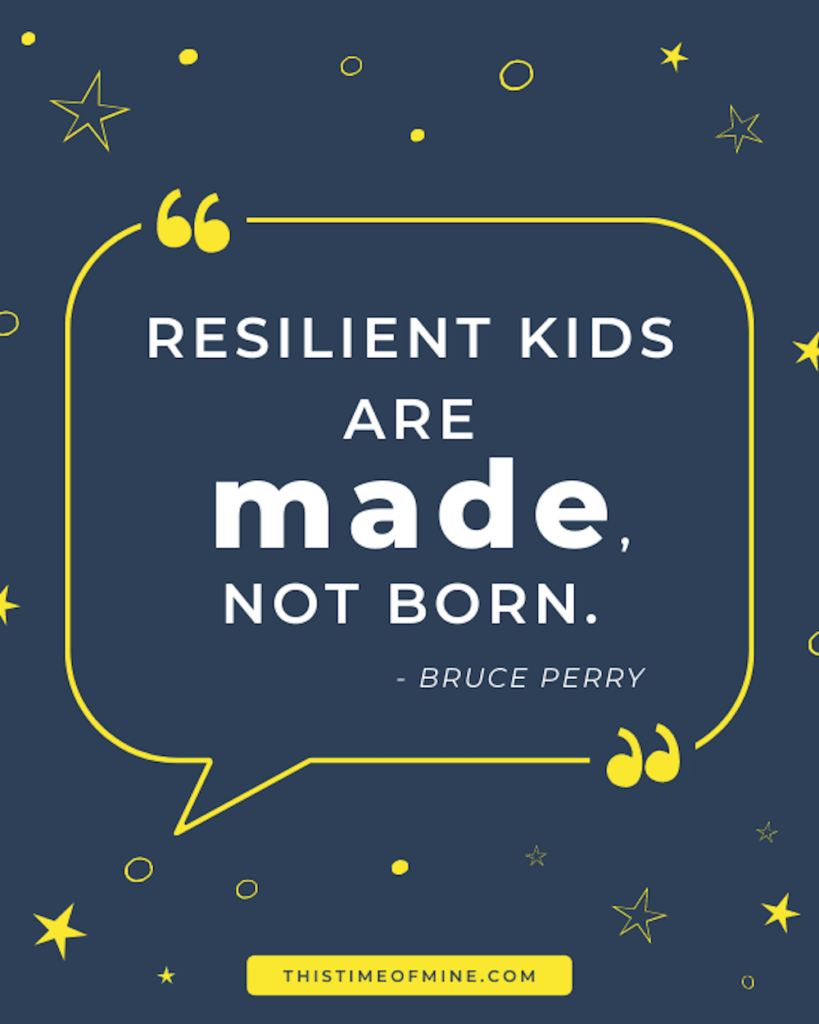
2. SET THE STAGE FOR THEIR SUCCESS
Kids are usually more capable than we give them credit for. But that doesn’t mean they can do everything on their own. They still need our help.
We can offer support by making it easier for them to succeed. Here are a few ideas:
- Keeping expectations age-appropriate
- Establishing routines to make transitions easier
- Making visuals for forgetful kids
- Teaching the skills necessary to complete a task (like cleaning up)
- Creating an organized environment so they can find and access things themselves
- Allowing extra time for everything (because kids take forever to do things, let’s be honest)
In reality, much of what our kids experience each day is new and unfamiliar. And often, they experience more failure than success.
So when we take small steps to prime them for success, they can use those positive moments to build the confidence they need to keep going when things get hard.
3. LET YOUR KIDS MAKE MISTAKES
As tempting as it is to step in and take over – don’t!
Of course, there are times when our kids need our help. But more often than not, we interfere when we should step back and let our kids work things out (or deal with the natural consequences of their choices).
In a U.C.L.A. study on learning, researchers found that learning was actually enhanced when conditions were arranged so that students made errors. This is true in the classroom and at home.
When we support our kids through their mistakes, rather than helping them avoid failure, they’re able to think through what happened and figure out ways to avoid repeating those mistakes in the future. In short, they’re developing important coping skills.
So yes, this might mean a lower grade for forgotten homework, a less-than-perfectly-made bed, or even an eggshell in a batch of cookies, but it’s important for our kids to make mistakes so they can learn from them.
“From failure you learn. From success – not so much.” – Meet The Robinsons
4. STEP INTO A COACHING ROLE
Trial and error is a great way to learn. But that doesn’t mean we can’t help our kids learn from mistakes or deal with situations that are hard, confusing, disappointing or uncomfortable.
That’s where our job as “coach” comes in. Coaches teach skills, offer feedback, provide encouragement, and guide players toward success. But they don’t play the game. The kids do.
We can be the same way.
When we do things with our kids, rather than for them, we help them grow in both confidence and competence. We support while still providing room for independence and mastery.

5. TEACH PROBLEM-SOLVING SKILLS
Building on each of the previous tips, parents who learn to be a strong support system while allowing for mistakes are in a perfect position to teach important problem-solving skills.
Then, when our kids come to us with a problem, we can help them brainstorm ways to work through it.
For example, if your child keeps forgetting to practice their instrument, talk through specific solutions such as putting up visual reminders or working it into part of their routine. Or if your child is nervous about a test coming up, create a study schedule and come up with time management techniques together.
After a while, check back in with your child to discuss the results of their ideas.
Kids who know how to work through problems are more resilient. They know they can accomplish difficult tasks and even work through failures to find success. And the more they practice this, the more they will come to believe it.
6. PRAISE THE “HOW”
In her book, Mindset, Carol Dweck says “No matter what your ability is, effort is what ignites that ability and turns it into accomplishment”.
Two people might start off with the same ability, but over time, the one that learns how to define what they’re doing to improve is the one that actually improves. Natural talent can only take a person so far.
I saw this all the time as a music teacher, and I continue to see it in people all around me.
This is why it’s so important to be intentional when we praise our kids. It’s okay to praise their personal attributes (smart, pretty, handsome, etc.). But when it comes to accomplishments, be sure to praise their effort too, not just their results.
When we point out the “how” and praise the process, our kids will learn that their abilities can grow through hard work. They’ll develop a growth mindset as they recognize that they have the power to create success, even if it doesn’t come all at once.
7. HELP YOUR KIDS WITH THEIR EMOTIONS
Kids are faced with challenges every day. And sometimes, it’s too much to bear.
“I quit!” “I can’t!” “It’s not fair!”
When we hear phrases like these, our first instinct might be to stop these negative emotions. After all, how can kids be optimistic when they’re being so negative?
But we have to teach our kids that all emotions – even the negative ones – are okay. It’s normal to feel disappointed or angry when something doesn’t work out.
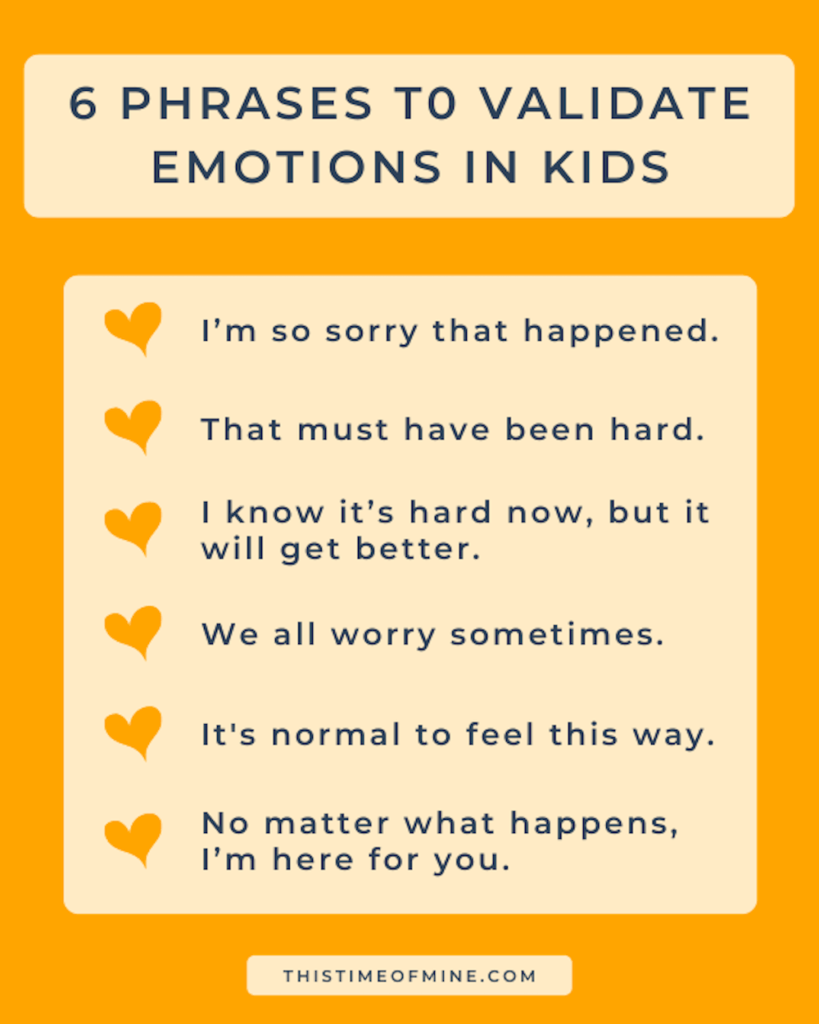
We can empathize with them, helping them feel validated, seen and heard. Phrases like “I get it” or “I understand that’s frustrating” can go a long way.
Once we’ve connected with our kids, we can help them deal with their hard emotions. We can talk through what happened, or even brainstorm ways to cope with their anger or frustration.
If any consequences are necessary, make sure they know the consequence is a result of how they handled their emotion (throwing, hitting, breaking something), not the emotion itself. Then you can talk through how to handle it better next time.
Learning to deal with emotions in a healthy way helps kids bounce back and cope with difficulty.
8. MODEL RESILIENCE FOR YOUR CHILDREN
One of the best ways to raise resilient kids is to be a resilient parent.
Lynn Lyons, co-author of Anxious Kids, Anxious Parents, talks about the importance of modeling positive behaviors. She says, “Kids watch adults and absorb how they are managing their own stress, how they problem-solve their own adult problems, how they talk catastrophically about grown-up things, or use avoidance and accommodation as a way to minimize their own uncertainty and worry.”
In short, our kids are learning from us. How are we doing?
Luckily, we don’t have to be perfect to be good parents. We just need to be consistent, reliable, and willing to admit and work on our mistakes.
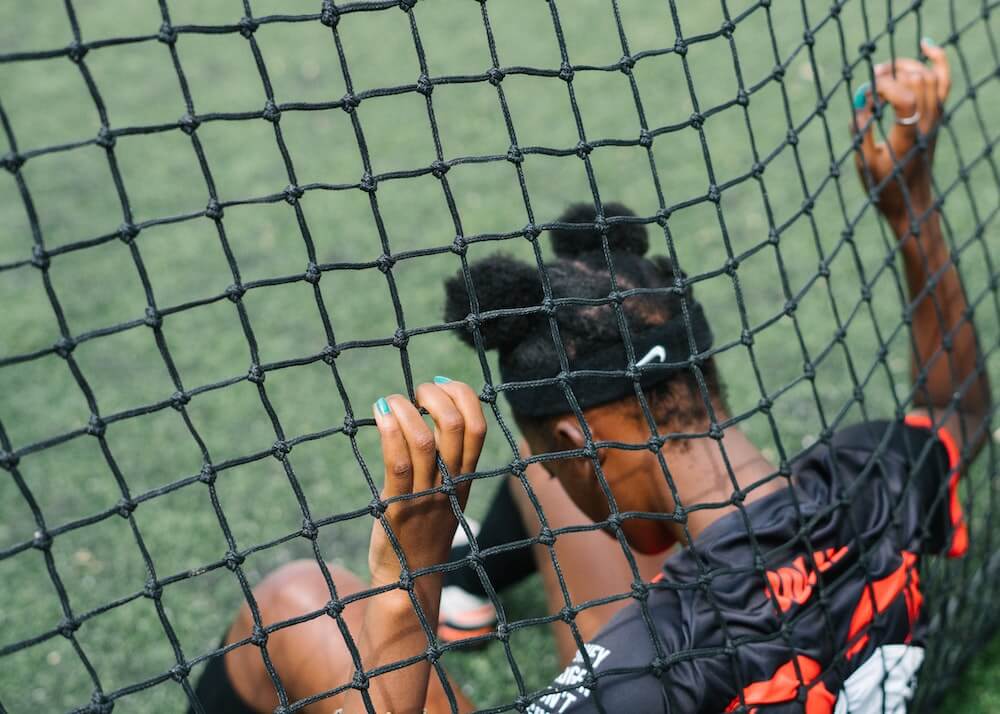
TO RECAP, HERE ARE THE 8 WAYS TO RAISE RESILIENT KIDS
Life is filled with challenges and disappointments. But that doesn’t mean our kids can’t learn how to be resilient and optimistic through it all. The key is to raise them with the tools they need to bounce back from challenges, solve problems, and find a way forward.
Here is a quick recap of how you can do that:
- Start by being a strong, reliable support system (and making space for other positive adult role models).
- Help your kids gain confidence by priming them for success.
- Allow your kids to make mistakes so they can learn from them.
- Step into a coaching role, and do things with your child, rather than for them.
- Foster independence by teaching your child how to problem-solve.
- Praise your child’s processes, rather than just the result, to develop a growth mindset.
- Help your child learn to embrace all emotions and deal with them in healthy ways.
- Be an example of resilience.
In the end, our goal is to raise resilient kids who can do things on their own. We wish we could shield them from difficulty and raise them in a bubble, but teaching them how to thrive – no matter what – is much better.
And if you’re looking for more ways to support your children in their growth, then you’ll love The Goal Setting Starter Kit. In it, you’ll find a goal ladder to help kids problem solve and set goals, along with useful tips for you.
OTHER HELPFUL POSTS:
- Look On The Bright Side: 7 Secrets To Raising Optimistic Kids
- Sick Of Repeating Yourself? What A Forgetful Child Really Needs
- Simple Ways To Help Your Child Feel Absolutely Loved
- Dream Big: How To Help Kids Set Goals (In 4 Easy Steps)
want to remember this?
PIN IT TO YOUR FAVORITE BOARD
Share this article:

